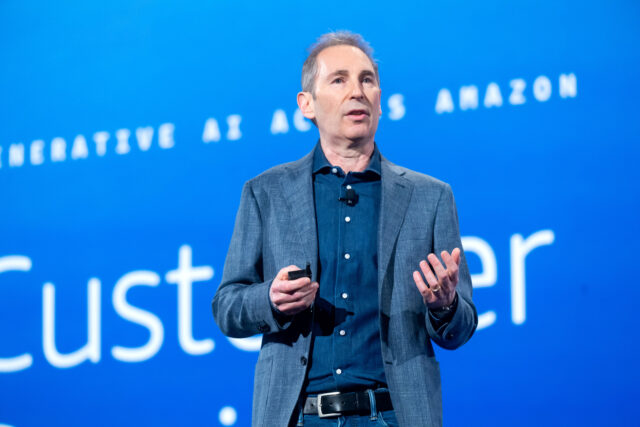Amazon Chief Says Tariffs Haven’t Pushed Up Prices, Undermining Critics’ Inflation Warnings

Andy Jassy, Amazon’s chief executive, said Monday that newly enacted tariffs on Chinese goods have not led to meaningful price increases on the company’s platform, joining a growing body of evidence suggesting that recent trade measures have not produced the inflationary surge predicted by many economists and critics of protectionist policy.
“Fortunately, we haven’t,” Jassy said when asked whether Amazon had raised prices in response to the latest round of tariffs. Speaking in an interview on CNBC’s Mad Money, he attributed price stability to a combination of strategic purchasing and seller preparation. “We did a lot of forward buying several months ago,” he said. “And then a lot of our sellers, our third-party selling partners, forward-deployed a lot of inventory to avoid some of the issues with the uncertainty around where tariffs are going to settle.”
Amazon, which operates a vast online marketplace with roughly two million third-party sellers, appears to be using its scale and internal competition to insulate consumers from cost increases. “Even those that decide they’re going to pass on whatever the tariff increase is in the form of price,” Jassy said, “there’s probably going to be a number of sellers who decide they’re going to take share and not increase prices.”
His remarks follow a series of government inflation reports that have shown only modest price pressures since the latest wave of tariffs was announced in April. Producer prices rose less than expected in May, and core measures of consumer inflation tracked by the Consumer Price Index and the Fed’s preferred Personal Consumption Expenditures index have remained stable or slowed. While critics of tariffs have long warned that broad import duties would result in higher prices for American consumers, recent data have so far failed to support that view.
Some analysts have pointed to the possibility of a delayed effect, noting that companies may still be relying on pre-tariff inventories. Others suggest that larger retailers like Amazon may be uniquely positioned to absorb or deflect short-term cost increases. Jassy acknowledged that some of the current stability may be due to proactive inventory moves by both Amazon and its sellers. But his comments also point to the broader resilience of Amazon’s supply network and pricing model.
The company’s annual Prime Day sale, scheduled to begin July 8, is expected to offer what Jassy called “very significant discounts,” even amid the trade-related uncertainty. “We know people are very sensitive about price right now,” he said, adding that Amazon had worked closely with sellers to ensure the deals reflect what customers actually want.
Jassy did not comment on the merits of trade policy itself. But his observations add to a narrative that has been gaining traction in recent months: that tariffs, while politically controversial, may not be the inflationary threat many once assumed.
Whether these trends hold through the fall and into the holiday season remains uncertain. But for now, one of the world’s largest retailers says it is managing rising import costs without passing them on to American consumers—a development that may bolster the case for those who argue that targeted tariffs can support domestic policy goals without undermining price stability.
Jassy’s remarks on CNBC echoed statements he made earlier this year. In May, he told shareholders that Amazon had “not yet seen any meaningful average selling price increases” as a result of the tariffs and said consumer demand remained strong. He emphasized that the company’s two million sellers respond differently to cost pressures, with many choosing not to pass on tariff-related expenses to customers. Notably, Amazon had briefly considered displaying tariff-related surcharges on product listings through a pilot program on its Haul discount site, but reportedly scrapped the plan after a phone call from President Trump to Amazon founder Jeff Bezos. The White House called the proposed pricing display “hostile and political,” and Amazon later confirmed the idea had been abandoned.